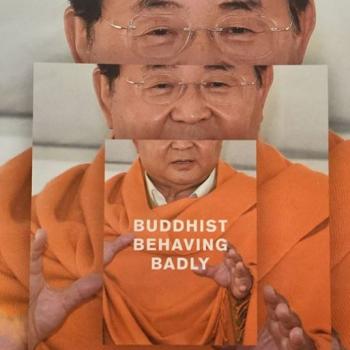 In my regular bits of avoidance and procrastination tonight (I have a lecture tomorrow that I desperately do not want to write or give), I came across an old blog post that brought a smile to my face. Below is a slightly revised edition, complete with comments. You can see the original from 2007 here.
In my regular bits of avoidance and procrastination tonight (I have a lecture tomorrow that I desperately do not want to write or give), I came across an old blog post that brought a smile to my face. Below is a slightly revised edition, complete with comments. You can see the original from 2007 here.
I came across a fairly obscure essay by Kant today, entitled: “You must Be Well Occupied To Be Happy.” It is extracted from his Lectures on Ethics, a book of notes of Kant’s students published after his death. It comes from courses in ethics that he gave from 1775 to 1781, some of the crucial years leading up the publication of his Critique of Pure Reason. They represent his sometimes beguilingly abstract mind at work on very practical, even folky, matters.*
Kant gives us some tantalizing quotes in this short essay (lecture):
“…for what is life? Life is the faculty of spontaneous activity, the awareness of all our human senses. Occupation gives us this awareness, and the more we feel our powers the more we feel that we are alive.”
There is almost a Nietzschian flare to this: BECOME who you ARE!! you can hear him booming – EXERT – LIVE – RISE UP!!! Indeed Sartre plays much on the notion of spontaneousness as central to an authentic being – neither collapsed in the structures (Buddhists can read ‘self-conceit’) of society or in mere self-denying hope for a future with no discernible connection with the reality of the present moment.
There is also the obvious ‘protestant work ethic’ shining through (“idle hands are the devil’s work”).
“Laziness reduces the degree of life. Unless man feels within him an impulse to activity, he will not even trouble to make a beginning; and since then all moral precepts are in vain, it must be the condition of all other duties that we should be energetic and zealous, show vigor and resolution in difficult tasks, and shun procrastination. Vigor is the reverse of indolence.”
Wow… more ‘work ethic’ perhaps, but also perhaps also reminiscent of an 8th century Buddhist we all know and love:
Out of fear of suffering, one should generate the aspiration as one contemplates its blessings.Uprooting its opposite in this way, one should strive to increase one’s zeal with the powers of aspiration, self-confidence, delight, dedication, and determination.
I must eliminate immeasurable faults for myself and for others. While the eradication of every single fault may take myriads of eons,
There I do not see even a small fraction of a beginning of the elimination of faults. Why does my heart not burst open when I am to be allotted immeasurable suffering?
(stanzas 31-34 from Shantideva’s Bodhicharyavatara, The Perfection of Zeal (or Energy))
Kant concludes by saying that we still get to rest at the end of a hard-worked day. We must distinguish between rest and ‘idleness’. The rest after a long day, or long life, of work can be considered as, “the tranquility of the sage.”
I like that. I like the youthful exuberance that I see in Kant’s philosophy, his revolutionary anti-authoritarianism, his fist-pounding exhortations to self-development and loyalty to our moral sense, his recognition that the world provides a thousand and one distractions and excuses keeping us away from that very moral nature within us. Kant thinks if we face this head-on we will come away better people.
He uses fancy words like ‘autonomous’, rational, etc, but what he aims at is simply that we are more solid individuals – less determined by the rise and fall of daily life – with a stronger ‘core’ that can be relied upon in difficult times. That makes good sense to me.
Just thinking about it, I feel happier. I hope you do too.
* I found this in a nice little work, The Human Search: An Introduction to Philosophy, by John Lachs and Charles E. Scott – a title I just grabbed from my shelf as I headed out to the gym. The book was a gift actually, from my boss at the Center for Ethics, Dane Scott – and while he is of no relation to Charles E. Scott, John Lachs was his Ph.D. advisor at Vanderbilt. The book looks great, perusing the excerpts which range from Thoreau to Aristotle, Gandhi to Walt Whitman, Rudolf Otto to Friedrich Nietzsche. The title from Kant just sort of jumps out at me (ok, I love Kant, but it is a strange title nonetheless), but the next one is even better, “Happiness Is Not Worth Having” by who else but Arthur Schopenhauer – the great philosopher of misery.
-
Tom Armstrong says:That does sound well occupied: reading dusty philosophy books while doing power lifts at Gold’s Gym.Being busy is good, surely, but it all does sound a little germanic to me. Are we sure that what Kant wanted occupied wasn’t … Poland?Contrarian that I am, perhaps, I am reminded a bit of a bit from a song from Cabaret, sung by Nazi youth:The babe in his cradle is closing his eyesThe blossom embraces the bee.But soon, says a whisper;”Arise, arise,Tomorrow belongs to me.”There must be another dimension to all of this yearning for busyness and the good feel of a day of rigor and the good sleep that follows.Is a little Schopenhauer really so bad? Maybe with a bowl of M&Ms; next to the reading lamp?
-
Buddhist_philosopher says:Tom – funny stuff. Kant does go over the top at times. One sentence I should have put in was: “The busier we are the more we feel that we live and the more conscious we are of life.” Obviously he never met a 20th/21st century over-worked, hyperactive young professional (or academic) American. I’d be interested to know more about the society he lived in, but certainly being ‘more busy’ makes about as much sense to us today as being ‘more manly’. Schopenhauer, I fear, would neither read his book nor eat his M&Ms.; He would just sit there and stare coldly at anyone passing by.
-
Tom Armstrong says:“The ultimate aim of all love affairs … is more important than all other aims in man’s life; and therefore it is quite worthy of the profound seriousness with which everyone pursues it.” –Schopenhauer @ wikipediaIf I were to take the results of my philosophy as the standard of truth, I would have to consider Buddhism the finest of all religion.–Schopenhauer quoted in an article, called Schopenhauer and Buddhism in Philosophy East and West.Schopenhauer isn’t depressing. Why, he’s practically Mary Poppins. I’m tellin ya, the guy’s got game.
-
Buddhist_philosopher says:As a matter of fact, it can be disputed if Schopenhauer’s philosophy and Buddhism do indeed breathe the same atmosphere. Schopenhauer often put emphasis on Buddhism’s pessimistic outlook on earthly existence, but compared to his world view, which is very severe, Buddhism seems almost cheerful. From the article you linked to. — As far as I know the Buddhism that trickled into Europe in the 1800s was terribly simplistic and often misrepresented. To be sure, this [duhkha] is not opposed to anything Schopenhauer said, but it lacks the sheer disgust of life that is characteristic of hisdoctrine. He’s depressing. He liked Buddhism because he thought it was depressing too. Sad man.












